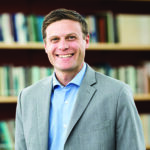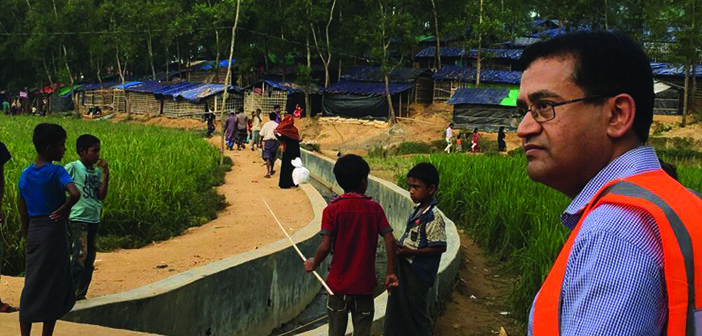Faculty share their experiences and the challenges with providing health care in humanitarian emergencies.
Cultural challenges and worldwide perceptions of humanitarian care are just some of the issues facing health care in a humanitarian crisis, as a panel of Brown faculty earlier this month discussed their own experiences and views in providing care worldwide.
Professor of Emergency Medicine Adam Levine, MD, MPH, who led the panel, summed up much of the discussion with a quote from a former UN High Commissioner for Refugees: ”There are no humanitarian solutions to humanitarian problems.”

Adam Levine
“I don’t treat underlying problems or give definitive care,” said Levine, the director for the Center for Human Rights and Humanitarian Studies at the Watson Institute for International and Public Affairs. “That’s what humanitarians do. They place bandages, and I think part of my education was understanding the limitations of what I could do but also understanding the importance of that work. Bandages save lives.”
Another panelist, Craig Spencer, MD, MPH, associate professor of the practice of health services, policy, and practice, emphasized that the humanitarian response “as we conceive it largely today is a Western phenomenon” and relatively new in human history. Amendment protocols added to the Geneva Conventions that defined standards of humanitarian aid and protections were only ratified in the late 1970s.
On top of this, he said, the values of humanitarian responses are informed by Western cultural epicenters, which can lead to issues with deploying care in regions with differing norms. Only a few major organizations, such as Doctors Without Borders—for which Spencer is an advisory board member—make up 25 percent to 30 percent of all funding for humanitarian response, he said.

Craig Spencer
“We go into these crises with the idea that everyone has the same values,” Spencer said. “A lot of the needs and the narrative is driven by an understanding of humanitarian organizations seated in major Western cities like New York, Washington, DC, Amsterdam, Brussels, and Paris.”
Putting decision-making into local hands requires a transfer of power and money—a process that can be both slow and difficult, Spencer added. That being said, Ruhul Abid, MD, PhD, an associate professor of surgery (research) whose nonprofit, Health and Education For All, operates health clinics in Rohingya refugee camps in Bangladesh, explained the importance of understanding local geopolitical and cultural sensitivities.
“The other thing that is a major challenge is ensuring the safety of emergency workers,” Abid said. “There should be some understanding between the military and the local authorities.”

Hareem Park
Depending on locally contained decision-making is also challenging due to the realities of unfolding crises. Panelist Hareem Park, MD, an assistant professor of pediatrics, clinician educator, and volunteer with Doctors Without Borders, said she felt that humanitarian workers may feel a need to take on a greater burden as community and national representatives grapple with their personal issues.
“I felt that it was a lot to ask the local staff to continue to do the work as they are dealing with losing family members,” she said. “And so, in part, you feel like you want to do more, and you want to take on as much of the responsibility that you can. But there is some danger and challenges in taking on too many responsibilities.”
She added that volunteer health workers are outside the purview of nuances in geopolitical conflicts or cultural differences. She called the process a “difficult balance.”
“You don’t always know all the intricacies and you are trying to come from a good place, but the best intentions don’t always achieve what the aims are,” Park said.
Programming for vulnerable populations should be adjusted on a situational basis, and Abid used an example from his own experience in the Rohingya refugee camps. As part of a screening method for HIV and then following up with antiviral treatment, the records of the patients are concealed. The screening process may also involve separating patients by gender and performing examinations away from local centers, with community workers venturing out to patients’ homes to provide a discreet form of care. With certain infectious diseases and social taboos, some locals may see it as a danger and could isolate the patient.
If care is done at the expense of the patients’ privacy and ultimately their livelihood or standing, then responders will quite simply do bad instead of good, Abid said.
Addressing students interested in humanitarian work, Spencer advised that they determine what sort of humanitarian work they want to pursue, whether it’s completing a fellowship in international emergency medicine as he did, or joining an established program. It’s important for students to obtain the best training possible, rather than focusing solely on humanitarian health care ambitions, he said.
“It’s not going to be about your global health ambitions as much as it’s going to be about whether you’re a really good contributor and solid clinician and part of that department,” Spencer said. “That’s what’s going to matter the most.”
While there are supplemental training courses that provide introductions to important principles of international health care response, Spencer said that having a support system in place would also better prepare students for working abroad.
“Find a passion, find what you want to do, think about how much of your professional life you want to dedicate to it, and find mentors and people that have done it,” he said. “Reach out to them, send them emails, show up at their office and talk to them, because there is no set path for how to do this.”




